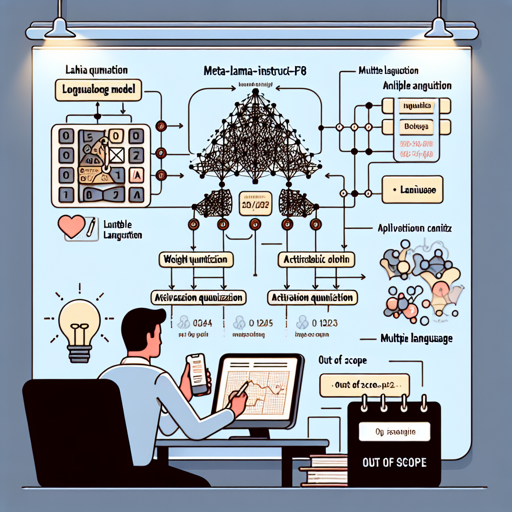The Meta-Llama-3.1-8B-Instruct-FP8 model employs advanced optimizations, making it an efficient choice for various language model applications. This blog post will guide you through deploying the model, its intended use cases, and troubleshooting tips for optimal performance.
Model Overview
- Model Architecture: Meta-Llama-3.1
- Input: Text
- Output: Text
- Model Optimizations:
- Weight quantization: FP8
- Activation quantization: FP8
- Intended Use Cases: Suitable for commercial and research use in multiple languages, particularly designed for assistant-like chat applications.
- Out-of-scope: Usage that violates applicable laws, including languages other than English.
- Release Date: 2024-07-23
- Version: 1.0
- License: llama3.1
- Model Developers: Neural Magic
Understanding Model Optimizations
The quantization process for this model is akin to downsizing a bulky suitcase for a trip. Just as you compress your belongings to fit into a smaller luggage, Meta-Llama-3.1 reduces the weight and activation parameters from 16 bits to just 8 bits without losing essence — allowing it to consume half the disk space and GPU memory! This makes the model agile and quick on its feet, ready to face various tasks efficiently.
Deployment with vLLM
To deploy Meta-Llama-3.1-8B-Instruct-FP8 using vLLM, follow the example code snippet below:
python
from vllm import LLM, SamplingParams
from transformers import AutoTokenizer
model_id = "neuralmagic/Meta-Llama-3.1-8B-Instruct-FP8"
sampling_params = SamplingParams(temperature=0.6, top_p=0.9, max_tokens=256)
tokenizer = AutoTokenizer.from_pretrained(model_id)
messages = [
{"role": "system", "content": "You are a pirate chatbot who always responds in pirate speak!"},
{"role": "user", "content": "Who are you?"}
]
prompts = tokenizer.apply_chat_template(messages, tokenize=False)
llm = LLM(model=model_id)
outputs = llm.generate(prompts, sampling_params)
generated_text = outputs[0].outputs[0].text
print(generated_text)
Steps for Model Creation
Creating this model utilizes the carefully crafted LLM Compressor, which helps in ensuring the achieved performance metrics while managing resource consumption.
python
import torch
from datasets import load_dataset
from transformers import AutoTokenizer
from llmcompressor.transformers import SparseAutoModelForCausalLM, oneshot
from llmcompressor.transformers.compression.helpers import (calculate_offload_device_map, custom_offload_device_map)
recipe = {
"quant_stage": {
"quant_modifiers": {
"QuantizationModifier": {
"ignore": "lm_head",
"config_groups": {
"group_0": {
"weights": {
"num_bits": 8,
"type": "float",
"strategy": "tensor",
"dynamic": False,
"symmetric": True
},
"input_activations": {
"num_bits": 8,
"type": "float",
"strategy": "tensor",
"dynamic": False,
"symmetric": True
},
"targets": "Linear"
}
}
}
}
}
}
model_stub = "meta-llama/Meta-Llama-3.1-8B-Instruct"
device_map = calculate_offload_device_map(model_stub, reserve_for_hessians=False, num_gpus=1, torch_dtype=torch.float16)
model = SparseAutoModelForCausalLM.from_pretrained(model_stub, torch_dtype=torch.float16, device_map=device_map)
tokenizer = AutoTokenizer.from_pretrained(model_stub)
output_dir = f"{model_name}-FP8"
DATASET_ID = "HuggingFaceH4/ultrachat_200k"
DATASET_SPLIT = "train_sft"
NUM_CALIBRATION_SAMPLES = 512
MAX_SEQUENCE_LENGTH = 4096
# Load and preprocess dataset
ds = load_dataset(DATASET_ID, split=DATASET_SPLIT)
ds = ds.shuffle(seed=42).select(range(NUM_CALIBRATION_SAMPLES))
def preprocess(example):
return {"text": tokenizer.apply_chat_template(example['messages'], tokenize=False)}
ds = ds.map(preprocess)
def tokenize(sample):
return tokenizer(sample['text'], padding=False, max_length=MAX_SEQUENCE_LENGTH, truncation=True, add_special_tokens=False)
ds = ds.map(tokenize, remove_columns=ds.column_names)
# Model compression
oneshot(model=model, output_dir=output_dir, dataset=ds, recipe=recipe, max_seq_length=MAX_SEQUENCE_LENGTH, num_calibration_samples=NUM_CALIBRATION_SAMPLES, save_compressed=True)
Performance Evaluation
This model has shown excellent scores across various benchmarks such as MMLU, ARC-Challenge, and more, proving its effectiveness in tasks requiring high precision. Below is a summary of average scores:
Accuracy Scores:
- Average Score (Meta-Llama-3.1-8B): 74.17
- Average Score (Meta-Llama-3.1-8B-Instruct-FP8): 73.67
Troubleshooting
While using Meta-Llama-3.1-8B-Instruct-FP8, you might encounter some challenges. Here are some troubleshooting tips:
- Always ensure you have installed the required libraries and dependencies.
- Check your GPU compatibility; some older GPUs may struggle with FP8 operations.
- If you face performance issues, consider adjusting the
sampling_paramssettings for better output quality. - For network issues, ensure your internet connection is stable, especially while downloading models or datasets.
- If unable to run code, verify if Python and library versions are updated.
For more insights, updates, or to collaborate on AI development projects, stay connected with fxis.ai.
Conclusion
At fxis.ai, we believe that such advancements are crucial for the future of AI, as they enable more comprehensive and effective solutions. Our team is continually exploring new methodologies to push the envelope in artificial intelligence, ensuring that our clients benefit from the latest technological innovations.

